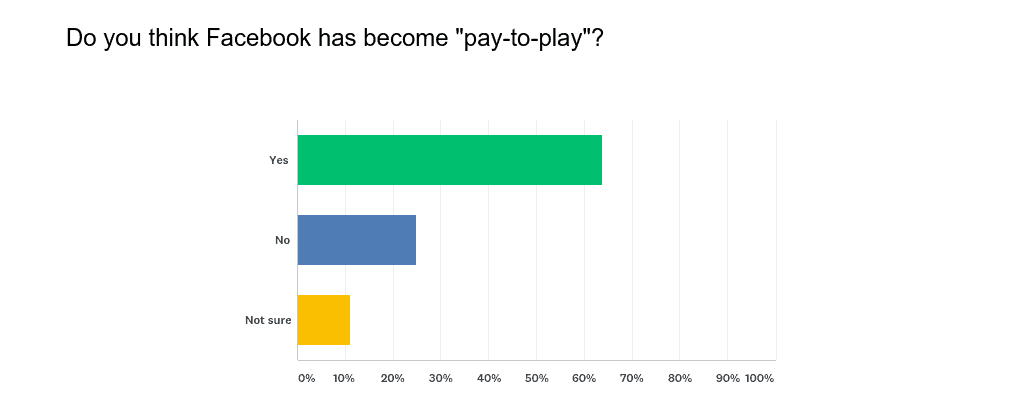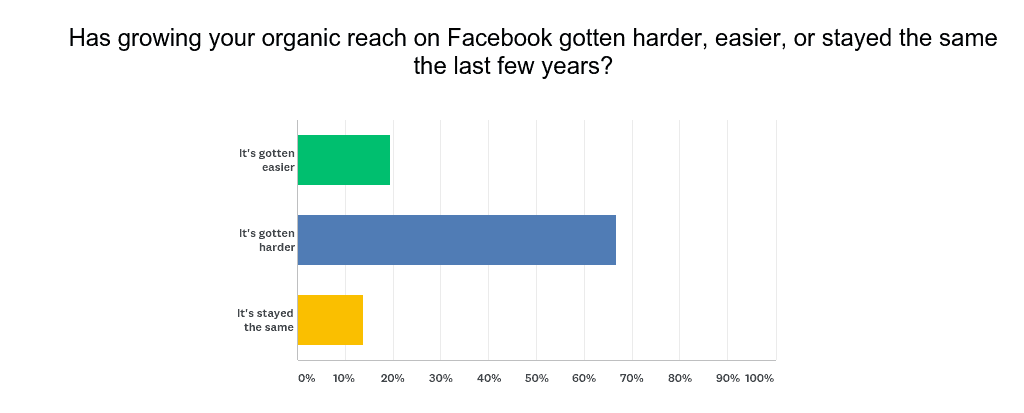Table of contents
Has marketing on Facebook become pay-to-play?
If you answered ‘yes’, you’re not alone.
Over 60% of marketers we surveyed said that Facebook has become pay-to-play, meaning it’s much harder to see value unless you’re investing advertising dollars into the platform. [Tweet this stat.]

So what happens if you don’t have the budget or resources to advertise on Facebook? We can still rely on good ‘ol organic reach on Facebook, right?
Unfortunately, marketers say that’s getting more difficult, too.
Facebook has been clear about recent algorithm changes: “Brands and pages are not so important anymore,” said Marko Saric, creator of How to Make My Blog. “People are.”
Which is why over 60% of our respondents also said that organic reach has gotten harder on Facebook over the past few years. [Tweet this stat.]

In reading statistics like these, you’d think any Facebook strategy that doesn’t involve ad budget is a waste of time, right? Not so fast.
We surveyed dozens of marketers and learned that many of them are getting creative in their Facebook strategies and actually expanding their organic reach.
Here are some of the best responses that we received, as well as a few dissenting opinions, on organic reach.
Editor’s note: Is your organic reach on Facebook growing or are you mostly seeing value through ads? Monitor your organic reach on Facebook with this free template to see where you’re performing well and which areas can be targeted for improvement.
Post Engaging Content
If there’s one thing we’ve heard over and over about organic traffic in general, it’s that you need content to get it. Many of the marketers we heard from said the same thing about getting organic reach on Facebook.
“Believe it or not, it’s pretty simple,” says Travis Hawley, VP of business development at Viral Nation. “Make compelling, relatable, valuable content that gets people itching for more.” Of course, your content needs to be targeted at your audience. You have to know what they’re going to engage with.
Source Content Ideas from Your Followers
John Sousa, campaign manager at 301 Digital Media, gave some advice on how to do that: “We’ve gotten many article ideas based on questions or comments that readers have submitted to our Facebook page, either directly through Messenger or in the comment threads of content that we’ve shared.”
Sharing the content that readers are asking for has helped 301 maintain their organic reach even when Facebook changes its algorithms.
Freelance marketer and designer Jackie Kossoff gave similar advice. When managing a client’s Facebook page, she looked at the types of content that had been popular in the past and what was popular with similar audiences. After including at least one piece of popular content per week, she saw organic reach increase by 81%. That’s no joke.
So Facebook, then, is like any other content delivery platform. It has to be tailored to the interests of your readers.
Interestingly, the marketers we surveyed mentioned two types of content. Some specifically mentioned creating your own content and sharing it on Facebook. Others recommended sharing articles and other relevant content from other sources.
Finding a balance between the two will help your organic reach.
Post Videos—Preferably Live
We heard it when we asked about free marketing on Facebook. Videos are the hot thing on Facebook as highlighted by experts in this Facebook study.
“Testimonial videos, interviews, small product demonstration videos, live or streaming videos, 360º videos, [and] ephemeral videos” are all options, says Sophie Miles, co-founder of CalculatorBuddy.com. She recommends using Facebook Stories and personalizing them to suit your audience.
Maristella Colombo, business coach and consultant at Ebooks4fashion, echoed this thought with a list of her own recommendations: pre-recorded video, Facebook Live videos, animated videos, slideshows, and GIFs. Of these, she says that Facebook Live has the most effect on organic reach.
“It’s most important to show yourself in videos,” said Colombo. “That’s how you’ll create a connection with your audience.” Measure the impact your videos have in increasing your organic reach using this social media dashboard software.
Algorithmic Advantages
Jean Ginzburg, digital marketing consultant, pointed out that Facebook prioritizes Live videos and pushes them to the top of users’ feeds.
P5 Marketing co-founder Irene Donnell also mentioned that Facebook’s investment in video means they’re competing against other sites like YouTube, and it’s not in their interest to send users to their competition. So marketers will be rewarded for keeping users on Facebook.
Before you start recording everything you do at your company, though, make sure to follow some best practices. Like adding captions.
“Most people view videos on their phone and will never turn the audio on,” says Stefanie Rosenfield, co-founder of Cleveland Marketing King.
“They’ll skip right over your content if you don’t have captions.” She pointed out that Facebook will automatically create captions, but that you should at least edit them to make sure they’re correct.
Be Social
Facebook is a social network designed around social interactions. Leveraging those interactions for organic reach is one of the refrains we heard from marketers. Claire Carradice from First Steps Online Marketing shared an example of her own success.
Tag People in Photos and Posts
While attending a local chamber of commerce meeting, Carradice decided to snap a couple photos on her phone. When she posted them on Facebook, she tagged four of the committee members. Those tags gave her a big boost in reach.
“By tagging four of the selected committee members, within one day my brand engaged with many people, the post was shared far more than it usually would be, [it] reached 723 people, and my business page received 10 new likes from people I would never have engaged with on my own.”
What did she learn from this experience? “[W]hen you tag people in meaningful moments, they are going to share that post as far as possible because they are proud of the moment.” It’s a simple lesson, but a powerful one.
Jonathan Aufray, co-founder of Growth Hackers, provided similar advice:
“Let’s say you’re sharing an infographic or a roundup post that talk about people and/or companies. When sharing this post or infographic, tag the people and companies in your post. This way, they will receive a notification, [and] there is a high chance these people will like and comment on it.”
Up Your Meme Game
“Post things people will want to tag their friends in,” said Meara McNitt, Online Optimism‘s social media strategist. She wasn’t the only one to mention this idea, and she wasn’t the only one to bring up memes.
Posting memes might not be your idea of a professional relationship with your users. But the results speak for themselves.
Kris Hughes, senior content marketer at ProjectManager.com, reported a 1,300% increase in 28-day organic reach using a combination of video and in-house-created memes. Memes had quotes related to the project management industry and were posted daily.
“It takes just a few minutes to create the memes in Canva or a similar free program using your brand mark and web address, and the ROI far outweighs the time consumption,” Hughes said.
Hughes also mentioned Facebook’s natural tendency to reward items like these with their algorithm. It was a common theme among marketers who suggested being more social.
Run Contests
We’ve seen that getting people involved with your posts is a great way to show Facebook that people want to see what you’re posting. And what better way to do that than with contests? Everyone loves winning.
“Asking users to [explain] why they want to win your prize, tag a friend they would share it with, or post a quick story to qualify will lead to some interesting comments and could spark continued conversations!” says Shane Carter, digital marketing specialist at Web Geeks.
“This will also show your page’s post to the friends in their social network, and a well-planned contest post can really snowball to provide a large organic reach in a short time.”
Never run a Facebook contest before? Don’t worry, Rod Brown, co-founder of OnceLogix, stepped up with the perfect workflow.
- Set a goal for your contest that will impact your organic reach. Make sure that your goal is specific and measurable.
- Choose the type of contest you’ll run based on your goal. If your goal is to generate leads, use a lead capture mechanism for grabbing email addresses, for example. If you want to grow your Facebook fan base, ask participants to like and follow your page to enter the contest.
- Determine the rules of entry. Once you’ve figured out how people are going to enter and what makes them eligible, you’re ready to start your contest.
Get Involved in Groups
Facebook Groups are hugely popular among users of the platform, and they can help you get great organic reach.
You have two options, says Oksana Chyketa, marketing specialist at Albacross. You can share your content in already existing Facebook groups, or you can create your own. Both, she says, are great for getting more organic likes.
You’ll need to share “high-quality, problem-solving, and engaging content,” she’s careful to note.
Laurel Mintz, founder of Elevate My Brand, suggested sharing “extras” and polling members of the community. This shows fans that your company is listening and lets them participate in discussions important to your brand.
Be Yourself
Small companies and freelancers have already started picking up on this trend. Part of being social is developing a personal connection to your audience. And that means you have to step out of your professional mindset sometimes.
Dash of Social founder Ashley Mason has found great success with making these personal connections. “Don’t be afraid to open up, share who you are, and let people see you outside of the business on social media.”
“Sharing what I do outside of working [and] telling my audience fun facts about myself” has had a great effect on Mason’s business. “[P]eople do business with people that they know, like, and trust,” she says, and there are few better ways to generate those feelings than social media.
Be Unique to Stand Out
In addition to the trends we saw above, we got all sorts of unique ideas. Auston Troyer, growth marketer at Proof, suggested asking followers to turn notifications on for your posts. Illustrator Jess Perna changes his header image every day.
Web Namaste‘s social media executive Hyfa recommends checking post insights and figuring out the best times of the day to post (and reports an increase of up to 75% in reach for this tactic).
Thierry De Vynck, founder of Great Scott!, echoed the sentiment: “[P]ublish your organic posts when your audience is online and right before your product or service is relevant.”
Facebook Messenger marketing can be extremely effective too, according to Ian Evenstar, founder of UNINCORPORATED. With an open rate of 60–80%, it’s hard to argue with.
Is Organic Reach Dead?
Interestingly, a few marketers told that Facebook organic reach is dead—or at least close.
“Organic posting is simply not enough these days,” said Cazana‘s marketing executive Teresa Walsh. Instead, she told us, organic traffic springs from effective paid promotion. Exequiel Pinlac from Royal Essence concurred: “[I]f you really want to gain more followers, we still do suggest using Facebook promotion.”
There was a great deal of variety in the answers we got to this question. From the ever-popular Live videos to sharing memes to relying on promotion, marketers have many opinions when it comes to organic reach.
But there’s no question that reaching users on Facebook is as important as ever. Maybe more so. So no matter how you decide to improve your reach on Facebook, stick with it and improve overtime based on insights from your social media dashboard.
Have you found other creative ways for expanding your organic reach on Facebook? Let us know in the comments. (If you think that there’s no way to reach your audience on Facebook without paying for ads, let us know that, too.)














